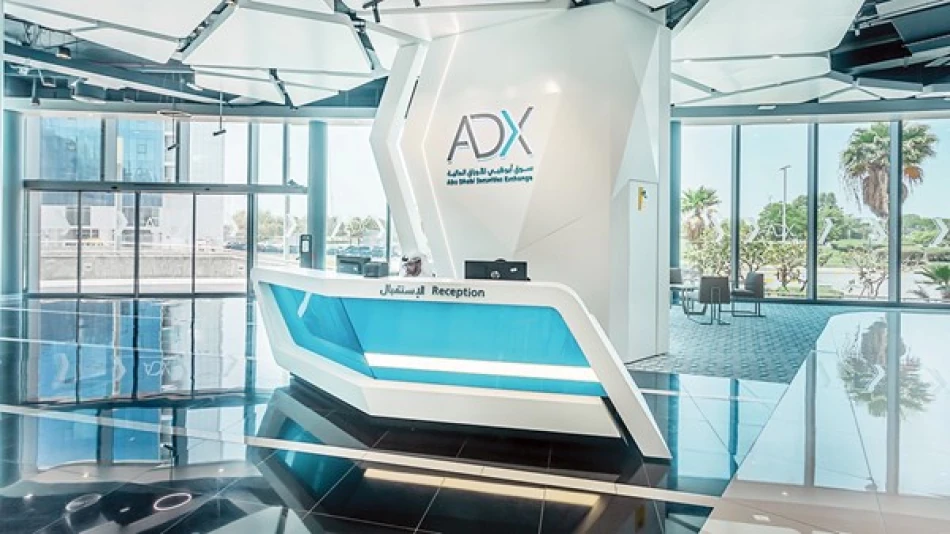
Abu Dhabi Stocks Reap AED 4.61 Billion in Market Gains
UAE Banking Stocks Drive Market Gains as Abu Dhabi Index Reclaims 10,000 Points
UAE equity markets opened the week on a positive note, with banking stocks leading the charge as the Abu Dhabi Securities Exchange climbed 0.22% to close above the psychologically important 10,000-point threshold at 10,036 points. Dubai's market also gained ground, rising 0.17% to 6,041 points, though foreign investors remained net sellers across both exchanges, signaling cautious optimism amid regional economic headwinds.
Abu Dhabi Market Strengthens Position Above Key Technical Level
The Abu Dhabi Securities Exchange demonstrated resilience by maintaining its position above 10,000 points, a level that often serves as a psychological benchmark for investor confidence. The index gained 22.27 points, supported by trading volume of AED 1.123 billion across 249.58 million shares in 22,918 transactions.
Market breadth remained relatively balanced, with 36 companies advancing against 40 declining stocks, while 45 shares remained unchanged. This mixed performance suggests selective buying rather than broad-based enthusiasm, indicating that investors are being discriminating in their stock picks.
Commercial Bank of Abu Dhabi Leads Banking Rally
The standout performer was Commercial Bank of Abu Dhabi, which surged 4.02% to AED 14.98, reflecting renewed confidence in the UAE's banking sector. This gain comes as regional banks benefit from higher interest rates and robust economic activity driven by the UAE's diversification efforts away from oil dependency.
IPEX Investment topped the most active list by value with AED 223.27 million in transactions, highlighting continued interest in investment vehicles as investors seek exposure to the UAE's growing economy.
Foreign Investment Flows Signal Cautious Sentiment
Despite the positive market performance, foreign investors remained net sellers in Abu Dhabi, offloading AED 18.86 million worth of shares. Foreign purchases totaled AED 400 million against sales of AED 418.86 million, suggesting international investors are taking profits or rotating capital to other emerging markets.
This selling pattern mirrors broader emerging market trends where foreign institutional investors have been cautious amid global monetary tightening and geopolitical uncertainties. However, the relatively modest net selling indicates that the UAE remains attractive compared to other regional markets.
Institutional Activity Reflects Market Maturity
Financial institutions also recorded net sales of AED 11.78 million, with purchases of AED 690.34 million offset by sales of AED 702.12 million. This institutional profit-taking behavior often signals a maturing market where professional investors are actively managing portfolios rather than simply accumulating positions.
Dubai Market Shows Resilience Despite Headwinds
Dubai Financial Market's 0.17% gain to 6,041.12 points was driven by heavyweight Emirates NBD, which climbed 2.36% to AED 26. The bank's strong performance reflects investor confidence in Dubai's economic recovery and the financial sector's ability to capitalize on increased lending opportunities.
Trading volume reached AED 634.23 million across 203.29 million shares in 14,710 transactions. While lower than Abu Dhabi's volume, Dubai's market showed better stock selection with 21 companies advancing versus 18 declining.
Market Capitalization Trends Reveal Investor Preferences
Abu Dhabi's market capitalization gained AED 4.61 billion to reach AED 3.102 trillion, while Dubai's market cap declined by AED 146 million to AED 1.033 trillion. This divergence suggests investors are favoring Abu Dhabi's larger, more established companies over Dubai's growth-oriented stocks.
Regional Context and Investment Implications
The UAE's stock market performance occurs against a backdrop of regional economic diversification and increased foreign direct investment. Unlike neighboring Saudi Arabia, which has seen more volatile foreign flows, the UAE markets are demonstrating stability that appeals to long-term institutional investors.
The banking sector's leadership reflects the broader economic transformation, as UAE banks benefit from increased lending to infrastructure projects, real estate development, and the growing fintech sector. This positions the UAE as a regional financial hub competing with traditional centers like Bahrain and emerging challengers like Saudi Arabia's NEOM project.
For investors, the current market dynamics suggest a selective approach is warranted, focusing on established banking names and companies with clear exposure to the UAE's economic diversification story. The modest foreign selling may present opportunities for patient investors willing to take advantage of any short-term price dislocations.
Most Viewed News

 Layla Al Mansoori
Layla Al Mansoori






